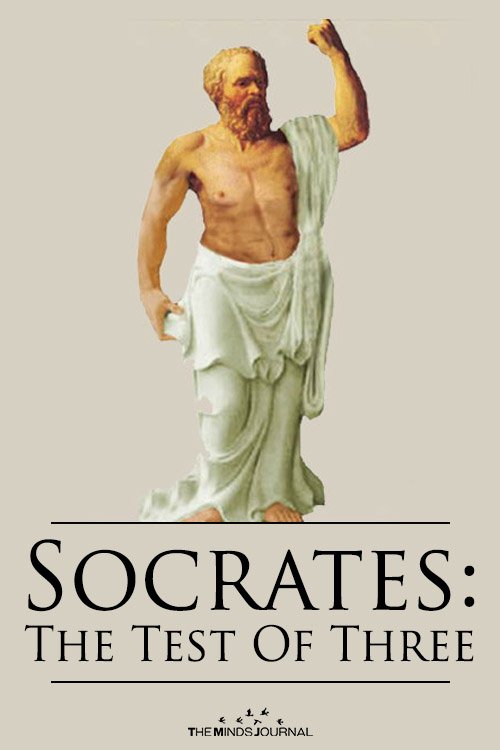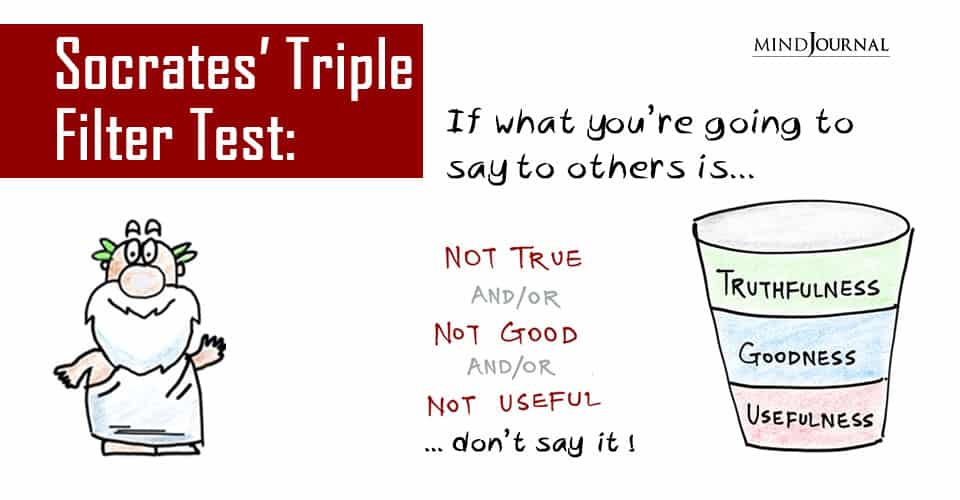There’s a common knowledge story kicked around about “The Triple Filter Test.” Sometimes it involves Socrates and other times it involves an Arab scholar, but the truth of the story is the same. Here it is:
***
In ancient Greece (469 – 399 BC), Socrates was widely lauded for his wisdom.
One day the great greek philosopher came upon an acquaintance, who ran up to him excitedly and said, “Socrates, do you know what I just heard about one of your students?”
“Wait a moment,” Socrates replied. “Before you tell me, I’d like you to pass a little test. It’s called the Test of Three.”Test of Three?”
“That’s correct,” Socrates continued. “Before you talk to me about my student let’s take a moment to test what you’re going to say. The first test is the Truth. Have you made absolutely sure that what you are about to tell me is true?”
“No,” the man replied, “actually I just heard about it.”
Related: 7 Thought-Provoking Lessons From Socrates, That Will Show You A Better Way Of Living
“All right,” said Socrates. “So you don’t really know if it’s true or not. Now let’s try the second test, the test of Goodness. Is what you are about to tell me about my student something good?”
“No, on the contrary…”
“So,” Socrates continued, “you want to tell me something bad about him even though you’re not certain it’s true?”
The man shrugged, a little embarrassed.
Socrates continued, “You may still pass though because there is a third test – the filter of Usefulness. Is what you want to tell me about my student going to be useful to me?”
“No, not really…”
“Well,” concluded Socrates, “if what you want to tell me is neither true nor good nor even useful, why tell it to me at all?”
The man was defeated and ashamed and said no more.
So, this triple filter test stands on three pillars – Truth, goodness, and usefulness.

Related: Here Are 24 Quotes From The Wisest Man Ever Lived: Socrates
In this digital world, information travels faster than fire. Isn’t it? This triple filter test is an interesting trick that can help you deal with gossips and rumors, which is a burning issue in this social media age.
People post every bit and piece of their life on social media, which makes them prone to gossips. Sometimes what you hear about people and what others know about you may not be correct. Not each and every message presented on social media is authentic. Often facts are integrated with fiction!
Related: Use the Socratic Method To Win Any Argument
If the information is fake or negative it can drain your mental energy and cripple your confidence, but motivate or energize you, if the message is true, positive, and useful. So, you must be careful about what you are going to say or listen to.
And, Socrates’s triple filter test is an excellent guide for you!
Before speaking something you must check out if you are sure what you are going to say is true. And if it is at all a good thing to say or useful to others. The filter of truth, goodness, and usefulness set a base for healthy and constructive communication. This is the reason Socrates was a great philosopher and held in such high esteem.
However, it may not always be easy to apply this triple filter test because the information you receive in the day-to-day life cannot be defined as true or necessary or good.
So, if you want to check whether the given information is true you may also consider other parameters like – will you be able to prove the information or verify the facts or will it tarnish your reputation and so on.
Related: Secrets Of Wisdom: How to Be Wise
Similarly, if you want to check out the goodness of the messages you receive, then you must consider – if it can help you and others improve, or evoke positive emotions, and change the present situation for good.
Likewise, while testing the usefulness of the information, check out if it can be put into good use, will there be any loss if it is unshared, and so on.
I hope this triple filter test helps you cope up with annoying rumors or gossips in your friend circle, workplace, or social network.
Feel free to share your thoughts in comments below and share the article with your friends.











Leave a Reply